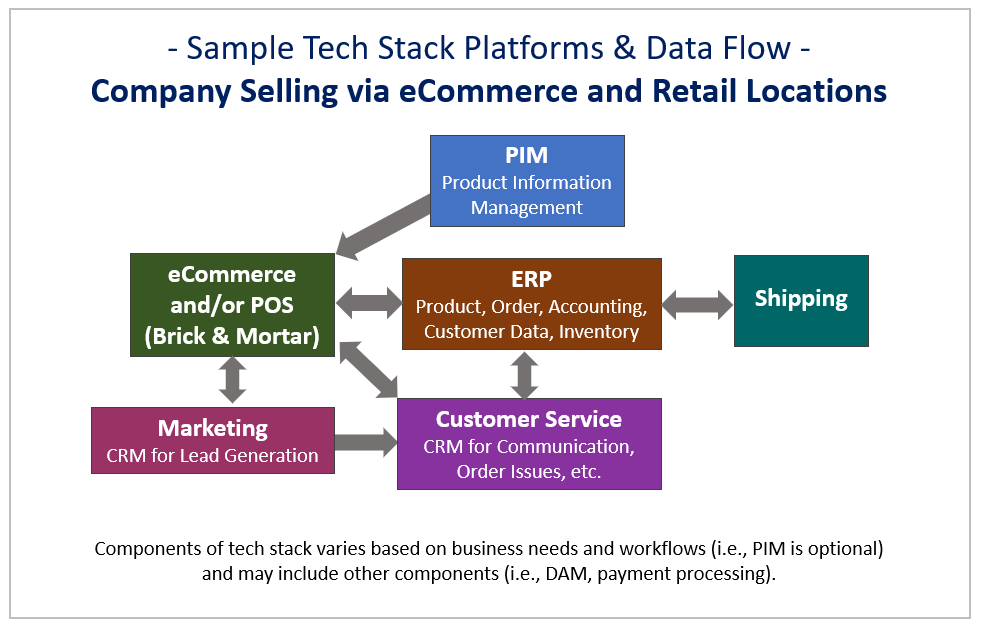In the contemporary business sphere, agility and innovation are more than just buzzwords; they represent the lifeline that guides companies to flourish in a dynamically evolving marketplace. As a vanguard in the digital transformation realm, the Harris Web Works (HWW) team firmly believes that nurturing a robust, integrated, and future-ready technology stack is not just beneficial but essential for businesses aiming to secure a dominant position in their industry.
The Genesis of Integrated Tech Environments
At the outset, let’s demystify the components that form the backbone of a modern business’s tech stack: ecommerce platforms, Customer Relationship Management (CRM) systems, Enterprise Resource Planning (ERP) solutions, Product Information Management (PIM), Digital Asset Management (DAM), Email Marketing tools, and Customer Support technologies. These components are the linchpins that ensure seamless operations, heightened customer satisfaction, and amplified revenues in today’s digital ecosystem.
Technology Stack Components
To thrive in today’s business landscape, owners must utilize digital tech to streamline operations and ensure a swift, seamless customer experience. This involves integrating legacy and modern systems through Application Programming Interface (API) technology. Custom and purchased connectors can integrate the following systems to create business-specific solutions:
- Ecommerce platform, i.e., Adobe Commerce
- Product Information Management (PIM) system, i.e., Sales Layer
- Enterprise Resource Planning (ERP) system, i.e., NetSuite
- Point-of-Sale (POS) system, i.e., Odoo
- Accounting system, i.e., QuickBooks
- Shipping platform, i.e., ShipStation
- Customer Resource Management (CRM), i.e., Hubspot
- Marketing, i.e., Klaviyo
- Customer Service system, i.e, Zendesk
- Amazon Web Services (AWS) On-Premise Managed Hosting
Ecommerce: The Modern Marketplace
In an age where the online marketplace is burgeoning, ecommerce platforms stand as the vanguard of retail innovation. These platforms are no longer just about selling; they are interactive spaces where customer experiences are crafted meticulously to foster loyalty and drive business growth. A well-optimized ecommerce platform can enhance customer engagement, streamline inventory management, and leverage analytics for insightful business decisions.
CRM: Nurturing Customer Relationships
CRM systems have transitioned from being mere databases to sophisticated tools that facilitate deep customer engagement. They encapsulate a 360-degree view of the customer, encompassing their preferences, behaviors, and interactions with the brand, fostering personalized and meaningful relationships that drive customer retention and brand loyalty.
ERP: The Backbone of Operational Efficiency
The ERP system functions as the neural network of an organization, seamlessly integrating various business processes to ensure operational efficiency. It fosters real-time communication between departments, facilitating quicker decision-making and streamlined processes, thereby being an indispensable tool for organizations aiming to achieve scalable growth.
PIM & DAM: Managing Information and Assets
In a data-driven world, managing product information and digital assets effectively is paramount. PIM solutions ensure that product data is consistently managed and disseminated across various platforms, maintaining data integrity and enhancing customer experiences. Simultaneously, DAM systems efficiently manage digital assets, ensuring easy retrieval and optimal utilization, thereby saving time and resources.
Email Marketing: Personalized Communication
Email Marketing remains a potent tool in the digital marketing arsenal, offering personalized communication pathways with customers. It facilitates segmented marketing campaigns that resonate with individual customer preferences, fostering higher engagement rates and conversion potentials.
Customer Support: The Cornerstone of Customer Satisfaction
In the digital age, customer support transcends beyond resolving issues; it represents the brand’s commitment to customer satisfaction. Modern customer support technologies, equipped with AI and machine learning, offer personalized and timely resolutions, enhancing customer satisfaction and fostering long-term relationships.
The Road Ahead
As businesses steer forward in this digitally dominated landscape, upgrading and integrating their tech stack becomes an exercise of strategic foresight. It is a journey of aligning technology with business objectives, fostering an environment where innovation thrives, and customer satisfaction is paramount.
December 27, 2023
All Deep Dive Articles

